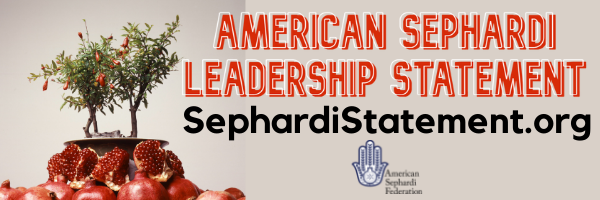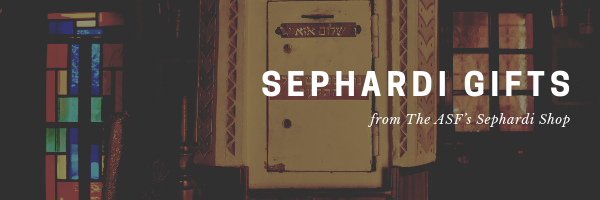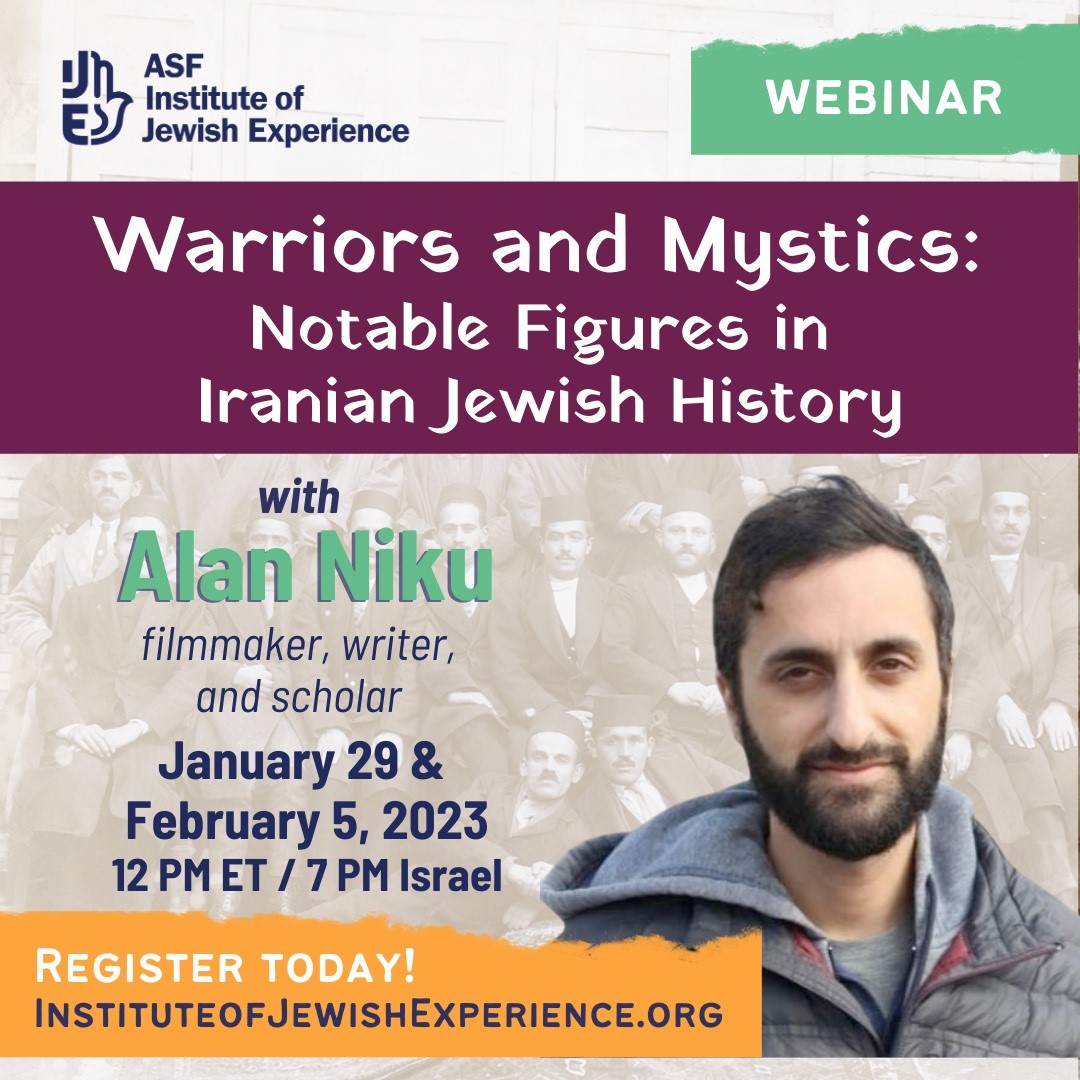In Memory of Lena Russo, A”H, one of the last of 35 Holocaust survivors from Kastoria, Greece. The pre-war community had numbered 1,000 Jews. Sent to Auschwitz, Lena recited the Shema to prove her Jewishness to the skeptical Yiddish-speaking inmates. These and other experiences from her remarkable life are immortalized in Trezoros, an exceptional documentary by Larry Confino and her son, Lawrence Russo. She received the praise of Greece’s then-Consul General at New York, Dr. Konstantinos Koutras, and an appreciative standing ovation from the audience for her inspiring words at the 20th NY Sephardic Jewish Film Festival’s screening of Trezoros. The ASF’s annual New York Ladino Day is dedicated to her memory. Sign-up now for the 6th edition, Kontar i Kantar, this Sunday at asfny.org
The Sephardi World Weekly is made possible by Professor Rifka Cook, Maria Gabriela Borrego Medina, Rachel Amar, Deborah Arellano, and Distinguished ASF Vice President Gwen Zuares!
Click here to dedicate a future issue in honor or memory of a loved one
🙏“Never Again – Remembering the Holocaust in Greece – A Book Review”
By Jim Claven, Neos Kosmos
Lena Russo, A”H, pictured here in Greece, was one of the last of 35 Holocaust survivors from Kastoria, a town that prior to the Shoah was home to 300 Sephardic families.
90% of Greece’s Jewish population was murdered during the Shoah. A new book, The Holocaust in Greece (Cambridge University Press, 2020), tackles the question of why so few Greek Jews survived. One main reason was the participation of local authorities and collaborators. The academic collection accordingly, “takes us through the role of these collaborators—from the leaders of the three successive collaborationist governments in Athens, through the regional and local administrations… to those who profited by the persecution of their fellow Greeks.” Difficult reading, but, “For all who say, ‘never again’, this book will be a welcome addition to their library.”
📖“The unspoken Holocaust”
By Jennifer Lipman, The Jewish Chronicle
Liberated Libyan Jewish Holocaust survivors returning to Tripoli, August-September 1945
(Photo courtesy of Yad VaShem)
Yossi Sucary remembers as a child growing up in Israel telling one of his teachers about his family’s suffering at the hands of the Nazis in Libya. The teacher refused to believe him, “‘She said ‘you’re mistaken. Only the European Jews were in the Holocaust.’” Perceptions are beginning to change, however, thanks in part to Sucary’s prize-winning novel, Benghazi - Bergen-Belsen, now part of Israel’s public school curriculum.
📚 “North Africa and the Holocaust”
By Michael Berenbaum, The Jewish Journal
Cover of The Holocaust and North Africa
(Photo courtesy of Stanford University Press)
The editing duo of Professors Aomar Boum and Sarah Abrevaya Stein have put together a book, The Holocaust and North Africa (Stanford University Press, 2018), that explores what happened to the Jews of North Africa during WWII, when colonialism and the Holocaust collided. The devastation of European Jewry has, understandably, caused scholars to often overlook the North African dimension of the Shoah. Nevertheless, “This book is an overdue and most necessary offering that should force a reconsideration of the issue.”
In commemoration of International Holocaust Remembrance Day 2020, the American Sephardi Federation co-sponsored Moment Magazine’s conversation with Professors Sarah Abrevaya Stein and Aomar Boum. Click here to watch.
Feature: ASF IJE News Works Wednesday “The Forgotten Part of WWII” ✡️🎙️
In this episode of ASF Institute of Jewish Experience’s New Works Wednesdays Dr. Reeva Spector Simon discusses her groundbreaking book, The Jews of the Middle East and North Africa: The Impact of World War II (Routledge, 2020). Writing in the Middle East Forum, Wolfgang G. Schwanitz, Bernard Lewis Senior Fellow at the Foreign Policy Research Institute, described Simon’s work as “the first country-by-country account” of how WWII impacted a million Jews, “from Morocco to Iran.” Simon’s comprehensive perspective creates, along the way, the context for understanding crucial aspects of modern Middle Eastern history, “Italian planes bombed Haifa in July and September 1940. In June 1941, the Luftwaffe bombed Tel Aviv, Jaffa, and Haifa. As German troops approached, the grand mufti of Jerusalem, Amin al-Husseini, called on the Arabs to kill Egypt’s 80,000 Jews. The Farhud pogrom in Baghdad killed 200 Jews in 1941.” Simon, an ASF IJE Advisor, served as Associate Director of the Middle East Institute (Columbia University) and a Professor of History (Yeshiva University). She is the author of Iraq Between the Two World Wars and co-editor of The Jews of the Middle East and North Africa in Modern Times.
The conversation is moderated by Dr. Ronnie Perellis, Chief Rabbi Dr. Isaac Abraham and Jelena Rachel Alcalay Associate Professor of Sephardic Studies at the Bernard Revel Graduate School of Jewish Studies and Director of The Rabbi Arthur Schneier Program for International Affairs at Yeshiva University.
🎥“The unsung Jewish resistance of the Holocaust”
By Eliezer Hayon, Ynet
A scene from The Night of Fools, which screened on Israel’s Channel One and at the 20th New York Sephardic Jewish Film Festival
400 members of the Algerian underground, almost all of them Jews, played an essential role in the Allied liberation of Algiers during World War II. Why is their heroism so unheralded? According to Rami Kimchi, the Israeli director of The Night of Fools,—a new film dedicated to telling the story of the Jewish-Algerian resistance—“The Jews here in Israel focused on the Ashkenazi Holocaust - the Holocaust in Europe,” while the “Holocaust of the Jews of North Africa” was forgotten.
See a Diarna Geo-Museum exhibit on Holocaust-era sites in Algeria, Egypt, Libya, Morocco, and Tunisia.
~~~~~~~
The American Sephardi Federation invites all individuals, communities, and organizations who share our vision & principles to join us in signing the American Sephardi Leadership Statement!
Please also support the ASF with a generous, tax-deductible contribution so we can continue to cultivate and advocate, preserve and promote, as well as educate and empower!
~~~~~~~
The Jews of the Middle East and North Africa: The Impact of World War II
By Professor Reva Spector Simon
Incorporating published and archival material, this volume fills an important gap in the history of the Jewish experience during World War II, describing how the war affected Jews living along the southern rim of the Mediterranean and the Levant, from Morocco to Iran.
Surviving the Nazi slaughter did not mean that Jews living in the Middle East and North Africa were unaffected by the war: there was constant anti-Semitic propaganda and general economic deprivation; communities were bombed; and Jews suffered because of the anti-Semitic Vichy regulations that left them unemployed, homeless, and subject to forced labor and deportation to labor camps.
Covering the entire Middle East and North Africa region, this book on World War II is a key resource for students, scholars, and general readers interested in Jewish history, World War II, and Middle East history.
Birkenau (Auschwitz II) How 72,000 Greek Jews Perished
By Albert Menache, M.D.
Memoirs of An Eyewitness; NUMBER 124454
This is the story of the destruction of the Balkan Sephardic Jewish Community by the Nazis in WWII. Written by the President of the Jewish Community of Salonica, Greece, it is the earliest published account by a survivor. Written while still in the concentration camp on smuggled paper, it has been out of print since the first edition appeared in 1947.
This new edition has been updated with historical documents, photographs, and notes on the restoration of Jewish life in Greece after the war.
Watch Dr. Joe Halio speak about “Dr. Albert Menache & The Holocaust in Salonika”
A Liter of Soup and Sixty Grams of Bread: The Diary of Prisoner Number 109565
By Heinz Salvator Kounio
Translated by Marcia Haddad Ikonomopoulos
On 15 March 1943 the first Greek transport left from Salonika bound for Auschwitz. Their arrival on 20 March was the beginning of the end of Greek Jewry. Among the 2,800 deported Jews was the 15-year old Heinz Kouinio. Wrenched abruptly from a comfortable upper-middle class home, Heinz found himself immersed in the horrors of the Nazi Concentration Camps. Heinz, along with his mother, father, and sister, would ultimately survive. What kept him going was his fervent wish that his murdered brethren would be remembered and that their killers would be punished. He had to survive to bear witness to that unbelievable horror. Heinz kept a diary in which he recorded his experiences. That diary is the basis of this book.
~~~~~~~
Upcoming Events or Opportunities
ASF Institute of Jewish Experience programming is asking for your input to better design our future program. This survey will not take more than 5 minutes and your input is very important.
All responses will remain confidential. In appreciation for your participation in the survey we would like to extend to you a complimentary course license ($40 value).
During 2022 we conducted over 60 programs covering different topics. Many of our programs are recorded and available on our web site at InstituteofJewishExperience.org.
Please share this survey with friends and family even if they didn’t attend our programs, their ideas are important for future programs.
We thank you for partnering with us to bring the most innovative and informative programs about our diverse Jewish nation.
~~~~~~~
The ASF Institute of Jewish Experience presents:
Warriors and Mystics
Iran’s Jewish community is one of the oldest diaspora communities in the world. But is there more to those 2700 years than Queen Esther and the Islamic Revolution? This talk examines the lesser-known parts of Iran’s Jewish History, a vast story of prophets, autonomous nations, divergent sects, epic poetry, and political intrigue.
Through the music, languages, foods, writings, traditions, and stories of two millennia, along with their ties to neighboring and faraway communities, the Jews of Iran have forged a culture at once Persian and Jewish, with traditions and aesthetics uniquely their own. In this two-part series, we will explore notable personalities in this rich history, from over 1,500 years ago and more recently.
On Sundays
29 January at 12:00PM EDT
Sign-up Now!
5 February at 12:00PM EDT
Sign-up Now!
(Registration is required for each session; Tickets: $11)
About the speaker:
Alan Niku is a filmmaker, writer, and scholar of Mizrahi culture from San Luis Obispo, California, based in Los Angeles. A native speaker of Persian, he spends his time learning related Jewish languages, deciphering Judeo-Persian manuscripts, and interviewing community members about their stories. He is also a musician and an amateur chef, teaches history and Jewish heritage at various levels, and seeks to educate the world about the underrepresented cultures of the Middle East through his writing and films.
Sponsorship opportunities available:
~~~~~~~
The American Sephardi Federation, the Sephardic Jewish Brotherhood of America, the Sephardic Foundation on Aging, and Shearith Israel League Foundation proudly present:
Kontar i Kantar:
The 6th Annual New York Ladino Day
Curated by Jane Mushabac and Bryan Kirschen
Featuring:
Tony- and Grammy-nominated Broadway star Shoshana Bean
A conversation with Michael Frank, author of One Hundred Saturdays: Stella Levi and the Search for a Lost World
Judith Cohen, Sing Me a Story, on Sephardic Romansas
Musical Finale, Susana Behar and guitarist Michel Gonzalez
In-Person! Also on Zoom
Sunday, 29 January at 2:00PM EDT
(Early Bird Tickets are $20)
Sign-up Now!
Sign-up for Zoom Now!
Ladino is a bridge to many cultures. A variety of Spanish, it has absorbed words from Hebrew, Turkish, Arabic, French, Greek, and Portuguese. The mother tongue of Jews in the Ottoman Empire for 500 years, Ladino became the home language of Sephardim worldwide. While the number of Ladino speakers has sharply declined, distinguished Ladino Day programs like ours celebrate and preserve a vibrant language and heritage. These programs are, as Aviya Kushner has written in the Forward, “Why Ladino Will Rise Again.”
Since 2013, Ladino Day programs have been held around the world to honor Ladino, also known as Judeo-Spanish. January 29th marks New York’s 6th Annual Ladino Day hosted by the American Sephardi Federation.
© Rhodes, mid-19th century Sephardi & Romaniot Jewish Costumes in Greece & Turkey. 16 watercolours by Nicholas Stavroulakis published by the Association of the Friends of the Jewish Museum of Greece, Athens, 1986.
Sponsorship opportunities available:
~~~~~~~
The Belzberg Program in Israel Studies at the University of Calgary and the Schusterman Center for Israel Studies at Brandeis University. With the collaboration of the American Sefardi Federation, Centro Sefarad Israel, and the International Network for Jewish Thought present:
Sephardi Modernities Seminar Series, 2023
Join us as we explore the relationship between our narratives about the past and the future to which we aspire. The ways in which scholars approach the stories, events, characters, and historical processes of the Sephardi/Levantine past are inevitably guided by values, by their moral and political beliefs. Which elements of the past do they strive to preserve, reclaim and grant continuity? What are they trying to say about a potential future? Which stories become part of canonized history, and which ones are dismissed as mere anecdotes? Which theoretical, social, political, and cultural frameworks do they wrestle with, and which do they seek to advance?
On Zoom
(Registration is required for each session)
2 February at 12:00PM EST
The Sephardi-Moorish Atlantic: The Two 1492s and the Multi-Chronotope of Orientalism
Ella Shohat, New York University, in conversation with Yuval Evri, Brandeis University
Sign-up Now!
14 March at 12:00PM EST
Preservation of Jewish Heritage and Debating Egypt’s Past and Present
Yoram Meital, Ben-Gurion University of the Negev
Sign-up Now!
23 March at 12:00PM EDT
How Do Judeo-Spanish Proverbs and Tales Communicate with Us and How Do We Communicate With Them?
Lital Belinko-Sabah, Hebrew University of Jerusalem
Sign-up Now!
18 April at 12:00PM EST
‘Modernity’ and ‘Tradition’ on the Move: Spanish Moroccan Jews and their Diasporas
Aviad Moreno, Ben-Gurion University of the Negev, in conversation with Angy Cohen, University of Calgary
Sign-up Now!
9 May at 12:00PM EST
Sephardi Musical Modernities: Listening to the Past in the Future
Edwin Seroussi, Hebrew University of Jerusalem
Yair Dalal, Composer, violinist, oud player, singer, and teacher
Sign-up Now!
Throughout this year’s series we will discuss the future invoked by each way of looking at the past, the political agendas of historical research, and the values that unavoidably guide scholastic inquiry. Topics include the transmission of narratives among collectives and among researchers, ownership of archives, encounters with the past, the academic legitimacy of certain topics and collectives, vehicles of memory (music, oral history, proverbs, etc.) and the construction of historical narratives.
Organized by Dr. Angy Cohen, Inaugural Hy and Jenny Belzberg Postdoctoral Associate in Israel Studies, Department of Anthropology and Archaeology at the University of Calgary, and Dr. Yuval Evri, Assistant Professor of Near Eastern and Judaic Studies on the Marash and Ocuin Chair in Ottoman, Mizrahi, and Sephardic Jewish Studies, Brandeis University.
~~~~~~~
The ASF Institute of Jewish Experience presents:
Exclusive Authors Series with Joseph Sassoon
Join us for a new episode of Exclusive Authors Series with Joseph Sassoon discussing his new book “The Sassoons: The Great Global Merchants and the Making of an Empire.”
Tuesday, 7 February at 12:00PM EDT
(Complimentary RSVP)
Sign-up Now!
About the book:
The influential merchants of the nineteenth and early twentieth centuries shaped the globalization of today. The Sassoons, a Baghdadi-Jewish trading family, built a global trading enterprise by taking advantage of major historical developments during the nineteenth century. Their story is not just one of an Arab Jewish family that settled in India, traded in China, and aspired to be British. It also presents an extraordinary vista into the world in which they lived and prospered economically, politically, and socially.
The Global Merchants is not only about their rise, but also about their decline: why it happened, how political and economic changes after the First World War adversely affected them, and finally, how realizing their aspirations to reach the upper echelons of British society led to their disengagement from business and prevented them from adapting to the new economic and political world order.
About the author:
Joseph Sassoon is the director of the Center for Contemporary Arab Studies and Professor of History and Political Economy at Georgetown University. He holds the al-Sabah Chair in Politics and Political Economy of the Arab World. He is also a Senior Associate Member at St Antony’s College, Oxford. In 2013, his book Saddam Hussein’s Ba‘th Party: Inside an Authoritarian Regime (Cambridge University Press, 2012) won the prestigious British-Kuwait Prize for the best book on the Middle East. Sassoon completed his Ph.D at St Antony’s College, Oxford. He has published extensively on Iraq and its economy and on the Middle East. His latest book is titled: “The Sassoons: The Great Global Merchants and the Making of an Empire” (Pantheon, 2022).
Sponsorship opportunities available:
~~~~~~~
ASF Broome & Allen & ADL Collaborative for Change Fellow Isaac de Castro presents:
Entre Diasporas: Telling the Latin-American Jewish story. Contando la historia judía latinoamericana
Tell your story. Cuenta tu historia.
We’re looking for first-generation Latino Jews in the United States who immigrated because of political and social turmoil. Jews of Sephardic descent from Colombia, Cuba, and Venezuela that now reside in the Miami area will be given priority, but others are welcome to apply as well.
Fill out this form to be considered as an interviewee for this project. After you’ve submitted, we will be in touch promptly to set up a preliminary phone call.
Click here for more information.













